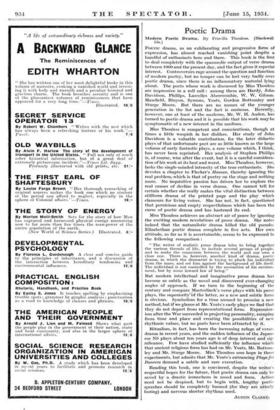Poetic Drama
POETIC drama, as an exhilarating and progressive form of expression, has almost reached vanishing point despite a handful of enthusiasts here and there. This book is the first to deal completely with the spasmodic output of verse drama between 1900 and the present day, and the fact gives it especial interest. Controversies rage around the question and function of modern poetry, but no temper can be lost very badly over poetic drama, since there is no inflammatory material lying about. The poets whose work is discussed by Miss Thouless are impressive in a roll call : among them are Hardy, John Davidson, Phillips, Lascelles Abercrombie, W. W. Gibson. Masefield, Binyon, Symons, Yeats, Gordon Bottomley and Sturge Moore. But there are no names of the younger generation in the list and the fact is ominous. Recently, however, one at least of the moderns, Mr. W. H. Auden, has turned to poetic drama and it is possible that his work maybe symptomatic of a new interest in the medium.
Miss Thouless is competent and conscientious, though at times a little waspish in her dislikes. Her study of John Davidson is a valuable contribution, for the later didactic plays of that unfortunate poet are as little known as the large volume of early fantastic plays, a rare volume which, I think, has never been reprinted. Her analysis of Stephen Phillips is, of course, wise after the event, but it is a careful considera- tion of his work at its best and worst. Miss Thouless, however, lacks the single-minded intensity of the true enthusiasts. She devotes a chapter to Flecker's Hassan, thereby ignoring the real problem, which is that of poetry on the stage and nothing more. No inquisitive passion has driven her to explore the real causes of decline in verse drama. One cannot tell for certain whether she really makes the vital distinction between stillborn drama of the printed page and the play which clamours for living voices. She has not, in fact, questioned that pernicious and empty respectfulness which has been the curse of poetic drama and has hastened its end.
Miss Thouless achieves an abstract air of peace by ignoring the exciting modern revolutions of prose drama. She notes indeed that the naturalistic drama killed the old pseudo.- Elizabethan poetic drama complete in five acts. Her own attitude, so far as it is ascertainable, seems to be expressed in the following comparison : " The writer of realistic prose drama tries to bring together the various threads of life, to include several groups of people, and to make the connexion between the world and our own a close one. There is, however, anothei kind of 'drama, poetic drama, in which the dramatist is trying to pluck his individual from the mass, and set him against the background of life, itself. The individual is not controlled by the necessities of his environ- ment, but by some inward law of being."
But modern intellectual and imaginative prose drama has become as subtle as the novel and discovered ever-changing angles of approach. If we turn to the beginning of the century and compare Maeteilincles verse plays with his prose plays, the superiority :Of the latter, as a new and subtle form is obvious. Symbolism for a time seemed to promise a new method, but if we glance at Mr. Yeats's early plays we find that they do not depart from representational form. Expression- ism after the War succeeded in projecting personality, escaping from time and place and creating the possibilities of new rhythmic values, but no poets have been attracted by it.
Ritualism, in fact, has been the increasing refuge of verse- drama in recent years, and the sudden influence of the Japan- ese No plays about ten years ago is of deep interest and sig- nificance. Few have studied sufficiently the influence which that ancient religious form has had on Mr. Yeats, Mr. Bottom- ley and Mr. Sturge Moore. Miss Thouless sees hope in these experiments, but admits that Mr. Yeats's entrancing Plays for Dancers demand a subtle and rare execution.
Reading this book, one is convinced, despite the writer's respectful hopes for the future, that poetic drama can.only be saved by a drastic iconoclasm in mood and form. Action need not be despised, but to begin with, lengthy poetic speeches should be completely banned (for they are utterly
boring) and nervous shorter rhythms used. •
AUSTIN CLARE:E.
















































 Previous page
Previous page